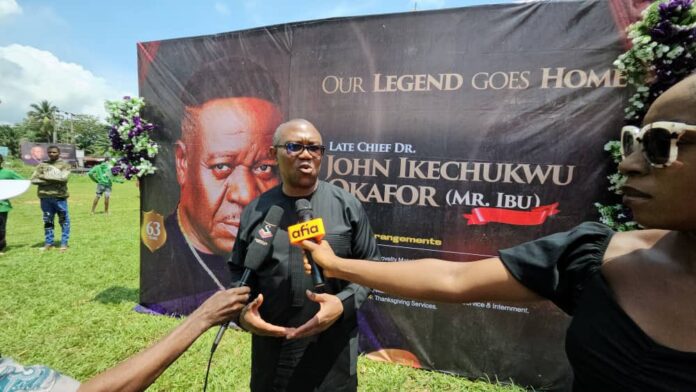Peter Obi, the national leader of the Labour Party (LP) and former governor of Anambra State, has returned from a transformative five-day visit to Indonesia, where he sought to gain valuable insights into the Southeast Asian nation’s economic growth and development. Obi, who has long been an advocate for economic reform and good governance, believes that Nigeria can draw important lessons from Indonesia’s recent progress.
In a candid interview, Obi explained that his journey to Indonesia was driven by a desire to understand how the country had made substantial progress across multiple sectors—particularly in areas such as healthcare, security, education, and poverty alleviation. With Nigeria continuing to struggle with a range of economic challenges, Obi sees Indonesia as a model for a more prosperous future, particularly in the context of addressing the pressing issues that continue to hold Nigeria back.
“My visit to Indonesia was an opportunity to study how a developing nation, with similar challenges to Nigeria, has made significant strides in the last two decades. I wanted to see firsthand how their policies have transformed their economy and social systems. Indonesia’s success is not by accident—it’s a result of deliberate and strategic planning, and that’s exactly what Nigeria needs,” Obi shared.
The key theme of Obi’s visit was an exploration of Indonesia’s growth trajectory, particularly since 2004 when the country’s per capita income was only $1,136, compared to Nigeria’s $963. However, the contrast becomes even starker when looking at the present day—Indonesia’s per capita income has surged to approximately $5,000, while Nigeria’s remains stagnated at around $1,000.
The statistics are even more telling when considering Indonesia’s improvements in key areas of development. While Nigeria continues to struggle with its Human Development Index (HDI) ranking, Indonesia has experienced a significant rise, from a “medium” rating in 2004 to a “high” rating in 2024. Meanwhile, Nigeria remains stuck in the low HDI category. Obi points to healthcare as a glaring example of this discrepancy.
“Indonesia now has 98% health insurance coverage for its citizens, which has had a profound impact on their health outcomes. In contrast, Nigeria’s health insurance coverage is barely 10%. This is just one example of how policy implementation in Indonesia has delivered tangible results, and it’s something Nigeria needs to learn from urgently,” Obi remarked.
Obi’s visit also included high-level meetings with key Indonesian figures, including former Vice President Muhammad Jusuf Kalla, former Minister Agung Laksono, and Yandri Susanto, the Minister of Villages and Development of Disadvantaged Regions. During these discussions, they explored the innovative policies and strategies that Indonesia employed to address its socio-economic challenges.
One of the critical areas of focus was poverty reduction. While Indonesia faced high levels of poverty in the early 2000s, the country has successfully lifted millions of people out of poverty in recent years. Obi emphasizes that this was made possible through targeted programs, such as financial inclusion initiatives, microfinance schemes, and rural development projects. These strategies were instrumental in reducing income inequality and ensuring that economic growth reached the most vulnerable populations.
“We cannot afford to keep doing things the same way in Nigeria. The poor and disadvantaged need access to opportunities, and we must prioritize initiatives that create jobs and empower local communities. Indonesia has demonstrated that even with limited resources, a focused effort can transform the lives of millions. Nigeria must do the same,” Obi added.
Obi also highlighted Indonesia’s effective security strategies as another key takeaway from his trip. The nation has been able to reduce violence, terrorism, and social unrest significantly over the years through a combination of military and community-driven approaches. Obi stressed that for Nigeria to achieve long-term stability and progress, it must strengthen its security framework, particularly in regions affected by insurgency and banditry.
While in Indonesia, Obi also took the opportunity to observe the country’s educational advancements, noting that Indonesia has invested heavily in improving its education system. This investment has led to a higher rate of literacy, improved vocational training programs, and greater access to quality education across the nation.
Obi’s reflections from his visit to Indonesia underscore his broader political agenda, which focuses on reforming Nigeria’s systems of governance and development. His trip was an extension of his broader mission to promote a more sustainable and inclusive growth model for Nigeria, one that prioritizes human capital development, job creation, and social mobility.
“I’ve always said that the answers to Nigeria’s problems lie within the country’s ability to learn from other nations and adapt their successful models. Indonesia is a country that was once in a similar position to Nigeria and has shown remarkable growth in recent years. There is no reason why Nigeria cannot achieve similar success if we commit to implementing policies that are people-centered and growth-driven,” Obi concluded.
Nigeria’s ongoing economic struggles have led many to call for fresh ideas and leadership, and Obi’s trip to Indonesia reflects his desire to explore innovative solutions to Nigeria’s systemic issues. In an era where many Nigerian leaders continue to prioritize short-term gains over long-term strategies, Obi’s insistence on learning from successful countries may offer a beacon of hope for those hoping for meaningful change in the country’s development trajectory. The trip, however, comes at a time when Obi’s political future remains uncertain, with many Nigerians questioning whether the current administration is truly committed to tackling the country’s most pressing issues. Obi’s efforts to foster greater international cooperation and learning from other nations, particularly in terms of developmental policies, suggest that his vision for Nigeria extends beyond political office.

